For Immediate Release
Nov. 7, 2025
Contact: Jon Melegrito
202-361-0296
jdmelegrito@gmail.com
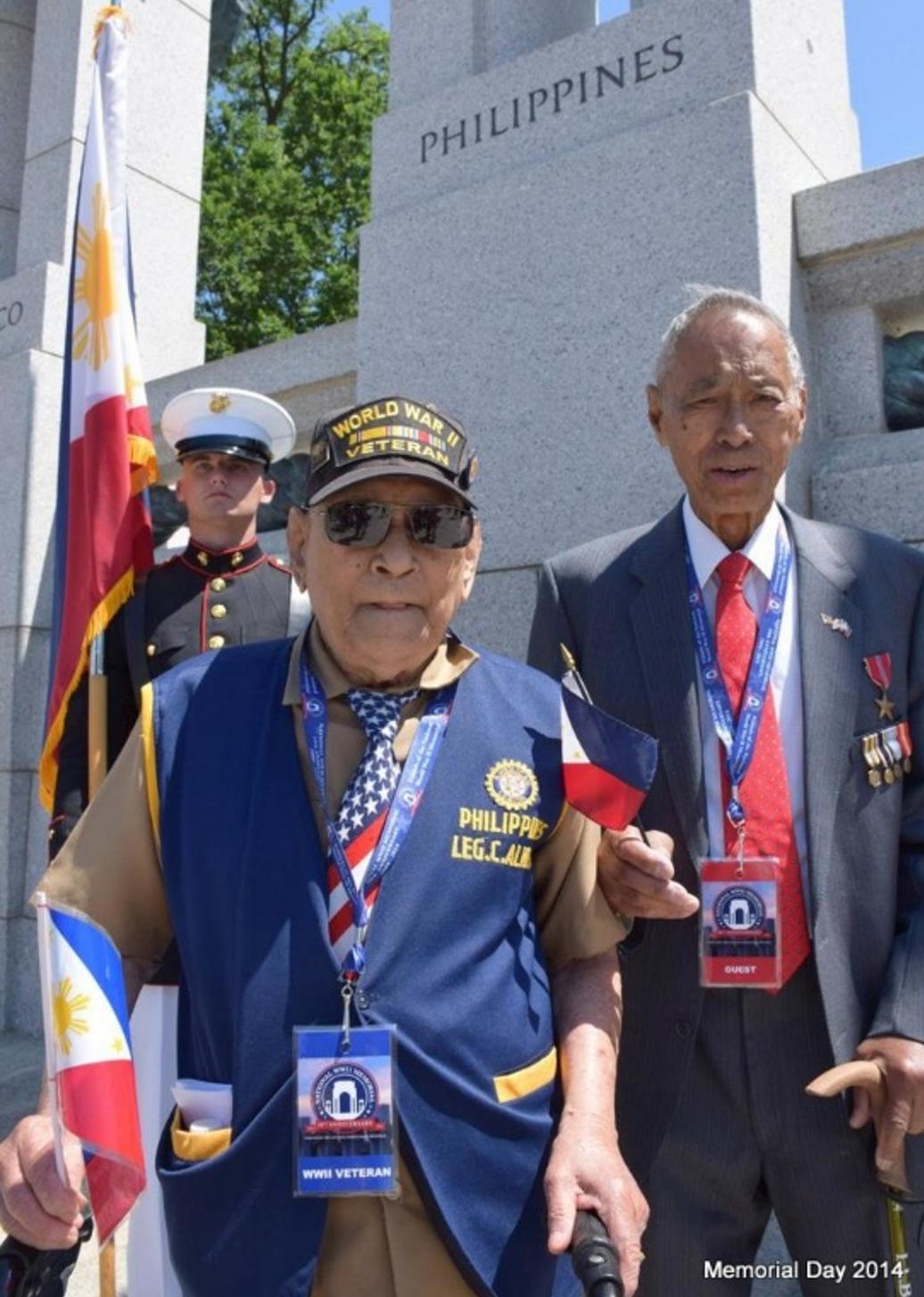
Filipino World War II Veterans Celestino Almeda (left) and Jesse Baltazar at a Memorial Day commemoration in 2014, National World War II Memorial (Photo courtesy of NBC News)
When 103-year-old Celestino Almeda received the Congressional Gold Medal award on behalf of the more than 260,000 Filipino and American soldiers who served in World War II, he closed his remarks with the famous quote, “Old soldiers never die; they just fade away.”
There was thunderous applause at Capitol Hill’s Emancipation Hall on Oct. 25, 2017 when Congress presented the highest civilian award. It was a proud affirmation that even in the passage of time, the enduring spirit of these old soldiers live on.
On Veterans Day, FilVetREP pays tribute to these heroes. “They do not want to be forgotten even in death. They want to be remembered simply for the honor and privilege of serving their duty to country – a cause worth dying for,” said FilVetREP Chairman Maj. Gen. Antonio Taguba (Ret).
In commemoration, FilVetREP is honored to highlight some of their stories, notably those who survived the war and continued to serve well into their aging years.
Celestino Almeda
After he retired as a 2nd Lieutenant in the Recognized Guerrilla Forces of the US Armed Forces in the Far East (USAFFEE), Almeda later immigrated to the U.S. and became a US citizen in 1996. He resided in the Washington DC area and became actively involved in the campaign led by the American Coalition for Filipino Veterans (ACFV), which was fighting for promised benefits that were rejected by the 1946 Rescission Act. For 20 years, his voice and presence were prominent in protest rallies and in the halls of Congress. Even when he reached the age of 100, he continued his tireless activism, braving heat or snow, calling attention to the injustice the Veterans suffered at the end of World War II. He was 104 when he died, leaving behind two sons, a daughter and several grandchildren and great grandchildren.
Jesse Baltazar
A Bataan Death March survivor who later joined the guerrilla movement, Baltazar was the first Philippine-born officer to be commissioned in the U.S. Air Force. He also served in the Korean and Vietnam Wars. After retiring from the Air Force, he settled with his family in Falls Church, Virginia, where he started a career in public service. He served in the U.S. State Department as a deputy provincial adviser in Vietnam.
Awarded the Purple Heart in 2015, Baltazar did not rest in his laurels. Like Almeda, he continued to join protest rallies, lobby US representatives and testify at Congressional hearings until he died at 95. Baltazar’s legacy as a soldier had passed on to his children. His son, Thomas Baltazar, followed in his veteran father’s footsteps and enjoyed twenty-six years of military service before retiring with the rank of a colonel.
Magdalena “Maggie” Estoista Leones
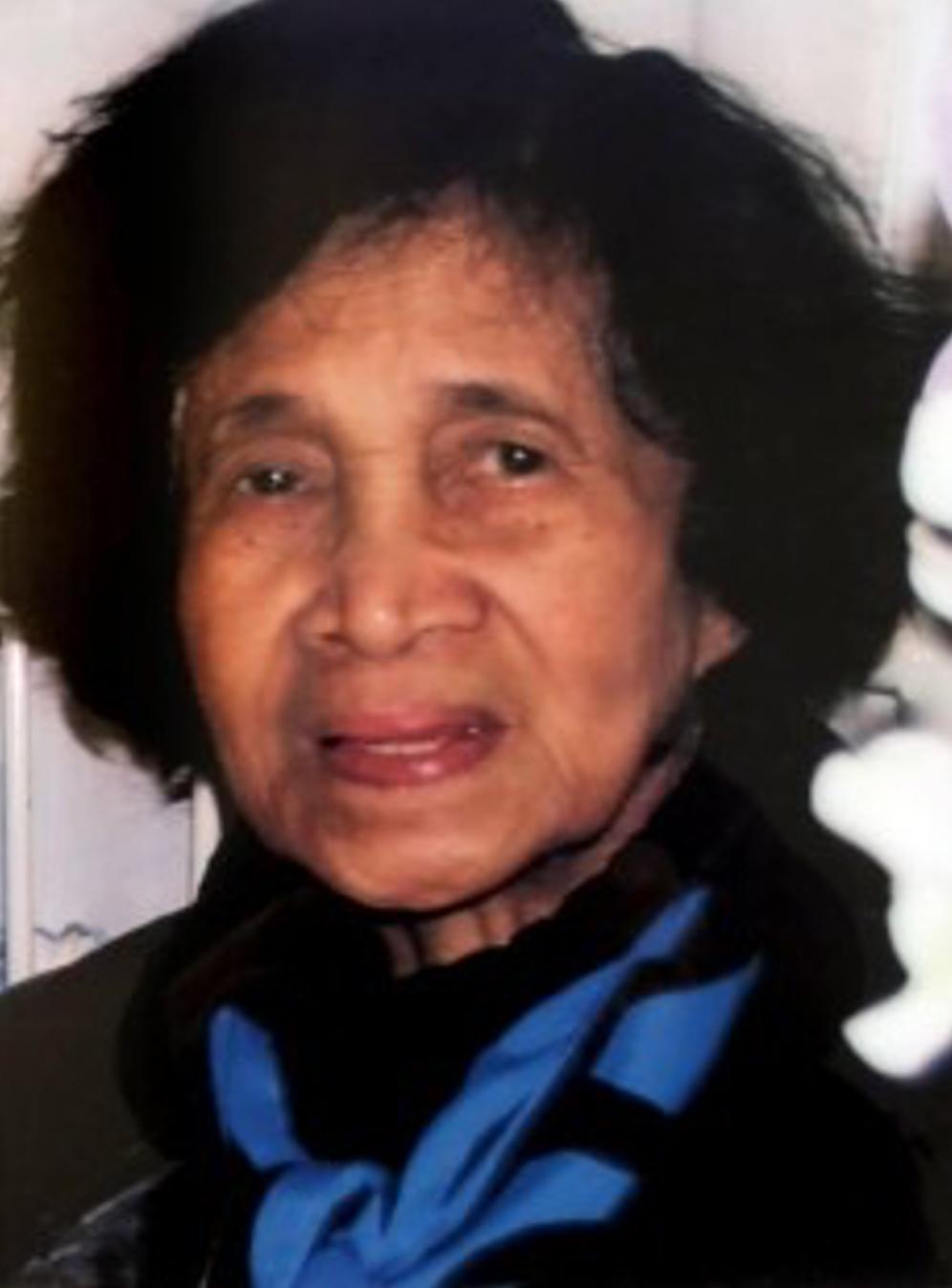 Known as the “Lioness of the Philippine Guerrilla Movement,” Leones played a crucial role during World War II. As a guerrilla fighter and a spy for the Allied forces, she was instrumental in gathering and transmitting vital information, saving countless lives. Her acts of heroism earned her the prestigious Silver Star, making her the only Asian woman to receive this honor during the war. Leones helped nurse wounded guerillas. She also saved Filipino evacuees from execution when she convinced Japanese troops that they came from a wedding.
Known as the “Lioness of the Philippine Guerrilla Movement,” Leones played a crucial role during World War II. As a guerrilla fighter and a spy for the Allied forces, she was instrumental in gathering and transmitting vital information, saving countless lives. Her acts of heroism earned her the prestigious Silver Star, making her the only Asian woman to receive this honor during the war. Leones helped nurse wounded guerillas. She also saved Filipino evacuees from execution when she convinced Japanese troops that they came from a wedding.
In 1969, she moved to California, where she worked at Pacific Bell as a clerk. Before she died at the age of 96, she was recognized by the San Francisco Board of Supervisors as someone who “has paved the way for many women that are breaking barriers in every arena.” Other tributes acknowledged the incredible contributions of women during the war, and their strength and courage throughout history.
Domingo Los Banos
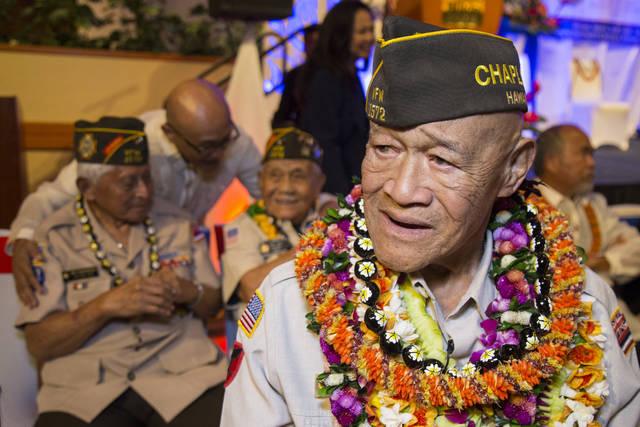
Domingo Los Banos (Photo courtesy of Honolulu Star-Advertiser)
A well-known Hawaii educator, Los Banos was instrumental in promoting recognition of Filipino World War II service and advocating for Filipino veterans’ rights and benefits. He used his personal connections with her U.S. Senator, Mazie Hirono, to urge passage of the Congressional Gold Medal. Hirono, of course, sponsored the bill, saying that recognition was a “long-overdue honor for hundreds of thousands of veterans and their families.”
Los Banos, who served with the 1st Filipino Infantry Regiment, took his first teaching job at Waimea Elementary on Kauai, where the family had moved when he was a preteen. He became a principal and eventually a district superintendent in the Leeward area on Oahu. As a Fulbright scholar, he spent part of his time in Thailand coaching a Thai basketball team. Three of the Los Banos brothers served in World War II, one in Korea and another in Vietnam.
Bert Pumento
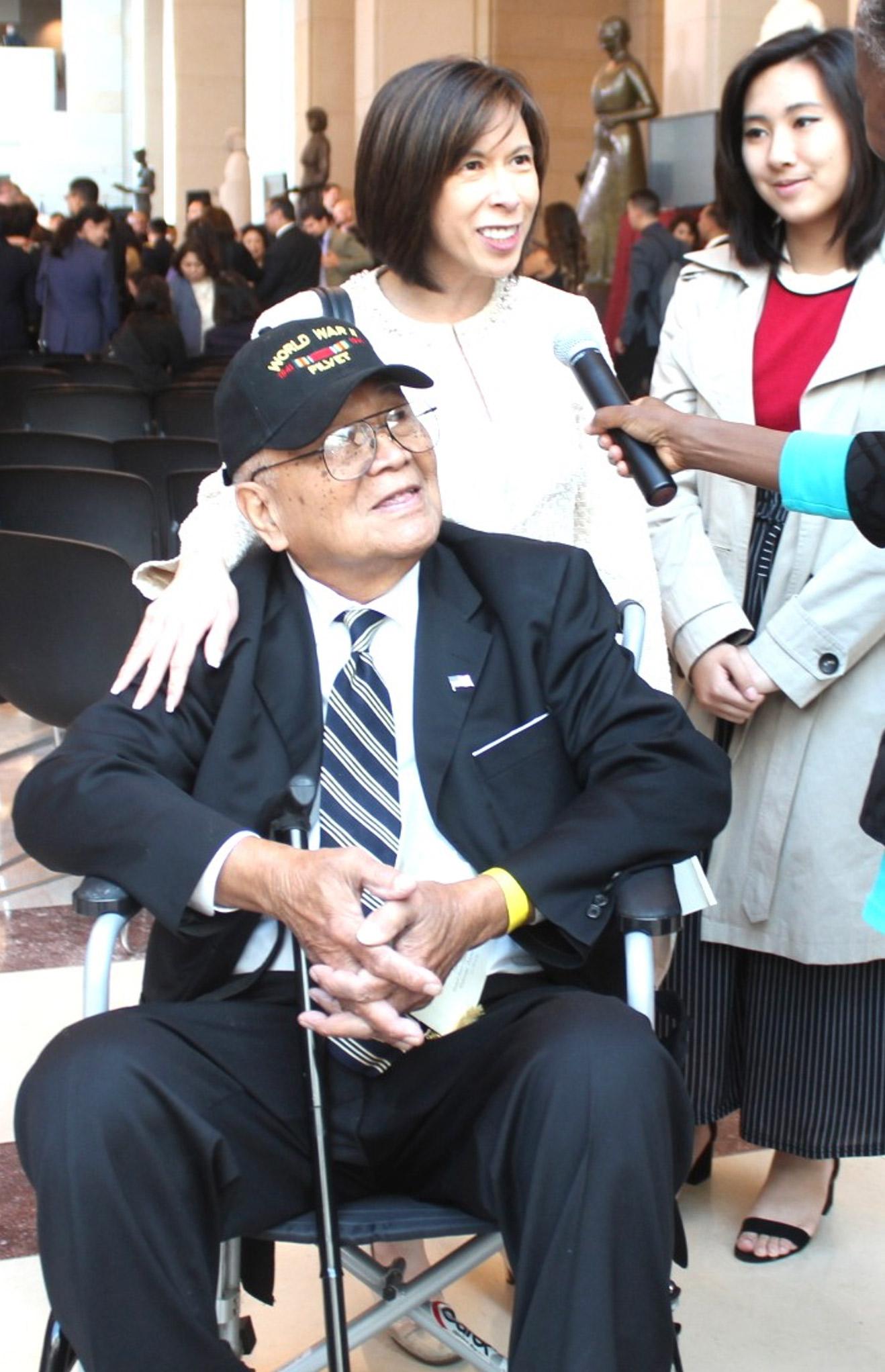
Bert Pumento with granddaughter Christine and great granddaughter Lauren
Pumento served with Filipino guerrillas during WWII in Leyte. He later joined the Philippine Scouts (US Army). After the war, he worked for the Veterans Administration, the United States Agency for International Development (USAID), the Peace Corps and the University of Hawaii, where he retired after 23 years of service. During his retirement, he was active with the Knights of Rizal and various other Philippine organizations.
Pumento’s granddaughter, Christine Garcia Pabico (former President of the Philippine Nurses Association of DC) says “there is so much about his past we did not know. I am more in awe of him now, hearing what he and his comrades went through at such a young age.” She adds that their stories are “enduring lessons about sacrifice, courage, resilience, triumph, and fruits of perseverance.” Pumento, who just turned 101 last July, lives in California.
Antonio A. Nieva
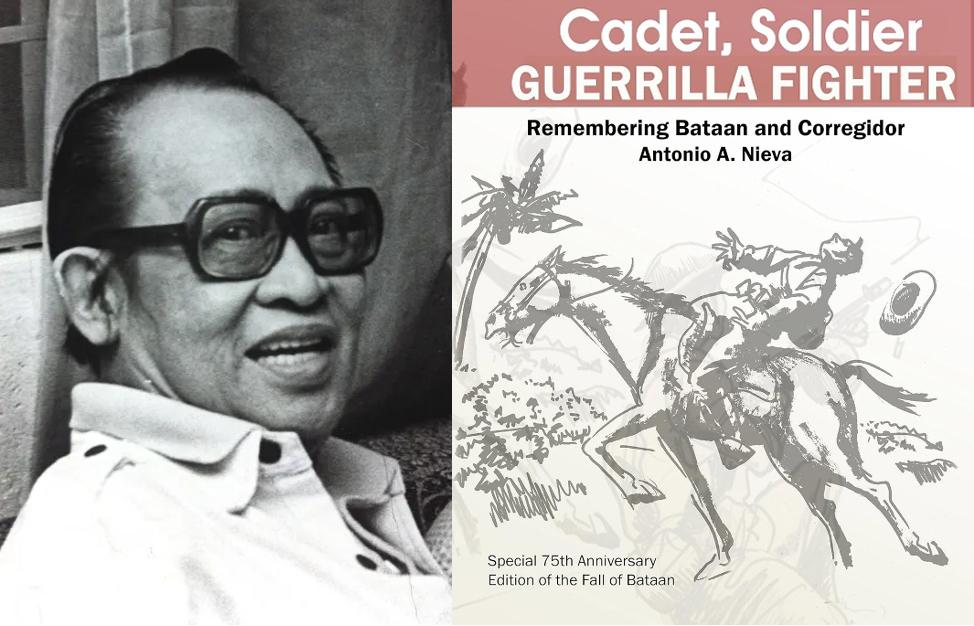
Known for his role as a guerrilla leader, Nieva recounted how the war affected not only the soldiers but the people of the Philippines during the Japanese occupation. In a book published in 1997, Cadet, Soldier, Guerrilla Fighter: Remembering Bataan and Corregidor, Nieva shared his personal memories of his ROTC days in Ateneo de Manila, “armed with a pistol from his ilustrado godfather and kisses from his novia,” to join the USAFFE.
FilVetREP Board Member Sonny Busa describes the book as “one of the best military personal narratives and historical accounts of the 1942 battles in the Philippines from a Philippine perspective. It enlightens readers about the significant role played by the 260,000 Filipino soldiers during World War II.” Adds Dr. Patricio Abinales, head of Center of Philippine Studies at University of Hawaii: “The book is a much-needed addition to literature on Filipinos who fought in World War II. Here are stories of young men who were forced by the circumstances to become ready to die in defense of the homeland.”
A commemorative edition of the book is an expanded version of the 1997 first edition, replete with illustrations by the author’s original sketches.
Preserving their Memories
Today, most of the 260,000 soldiers who fought under the American flag have died. “But even though they have faded away, their stories and memories will never die. Their legacies will continue to live on,” says Taguba. “We must continue to honor their sacrifices and remember their timeless contributions. We want to ensure that their story is enshrined in American history, that it will instill a sense of pride among future generations knowing what these old soldiers fought and died for.”
FilVetREP’s online education program, www.dutytocountry.org, is designed not only to create greater awareness about the untold story of Filipino World War II Veterans. It’s free and accessible to schools and scholars, researchers and policy makers, and other interested individuals. FilVetREP continues to provide updates to further enhance and expand its content.
###
The Filipino Veterans Recognition and Education Project (FilVetREP), is a nonpartisan, 501(c)(3) tax-exempt, community-based, all-volunteer national initiative whose mission is to obtain national recognition of Filipino and American WW11 soldiers across the United States and the Philippines for their wartime service to the U.S. and the Philippines from July 26, 1941 to December 31, 1946. For more information about Filipino WWII veterans and how to get involved, visit our website at www.filvetrep.org or find us on Facebook or Twitter.
